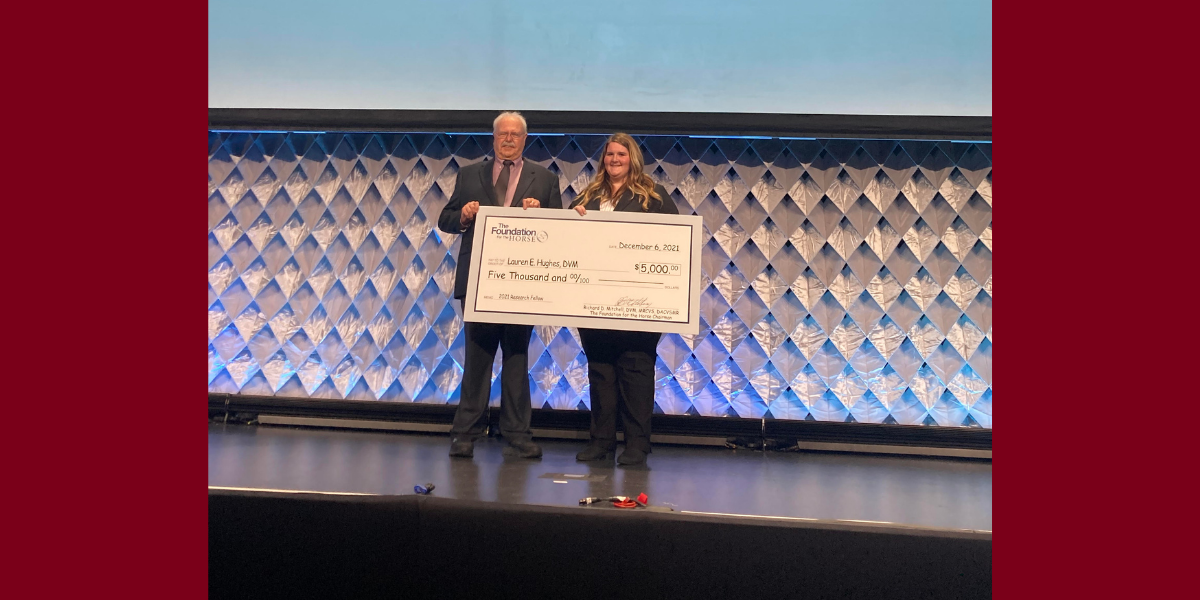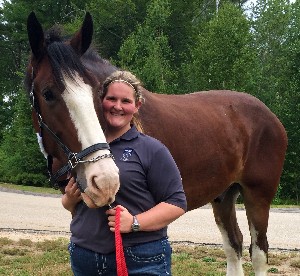Blazing a trail
PhD candidate Lauren Hughes chosen as first recipient of equine research scholarship

PhD candidate Lauren Hughes chosen as first recipient of equine research scholarship
Lauren Hughes (right) is presented with a scholarship award during the annual American Association of Equine Practitioners convention on Dec. 6, 2021. Photo courtesy of The Foundation for the Horse.
Dr. Lauren Hughes, a PhD candidate at the University of Minnesota College of Veterinary Medicine, has been selected as the inaugural recipient of The Foundation for the Horse Research Fellow scholarship.
The $5,000 scholarship is awarded to a doctoral or residency student who has made significant progress in the field of equine health care research. Hughes will be honored for her investigation of the genetics of pituitary pars intermedia dysfunction (PPID) in horses at an award ceremony held on Dec. 6, 2021, during the annual American Association of Equine Practitioners convention.
“I was very honored to be the first recipient of this research fellowship,” Hughes says. “The Foundation for the Horse is an incredible organization that places the utmost emphasis on supporting and improving the health and livelihood of the horse. It was exciting that our research was recognized through this award as we strive to work toward the same goal of advancing equine health.”

PPID is a common disease affecting older horses that has significant welfare impacts ranging from loss of use to death. PPID treatment is aimed at slowing the progression and managing clinical signs of this disease. The disease is relatively prevalent, affecting 15 to 30 percent of horses above the age of 15.
“The aim of our research is to investigate the genetic contribution to PPID and if alleles (mutations) are identified with an associated risk, the potential for altered diagnostic or therapeutic options could improve our ability to diagnose and treat this condition effectively,” Hughes says.
Current treatment relies mostly on a drug called pergolide, however varying efficacy has been reported and a subset of horses suffer from adverse effects when on this drug, mostly notably anorexia and weight loss. If genetic differences are identified, these animals may be able to benefit from altered treatment protocols that may increase veterinarians’ ability to appropriately treat this condition while mitigating adverse effects.
Hughes’ interest in equine care began at a young age when she developed a strong love and appreciation for horses while riding, teaching lessons, and running horse shows. She earned her DVM from Iowa State University. Following graduation from veterinary school, Hughes pursued additional training through an internship and a large animal medicine residency.
At the same time, she started her research career through a PhD program at CVM, where she is advised by Dr. Molly McCue, associate dean of research and professor in the Department of Veterinary Population Medicine. Hughes says she was fortunate to be able to collaborate with many accomplished researchers that have been integral to what is known about PPID today.
“I’m very lucky to have worked under many incredible equine veterinarians that inspired my dedication to this field and created the desire for me to pursue additional training to help find ways to continue to give back to horses and the horse community,” Hughes says.